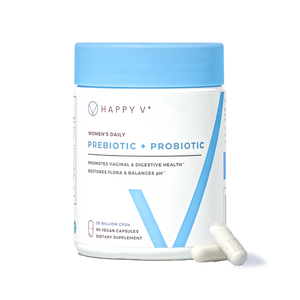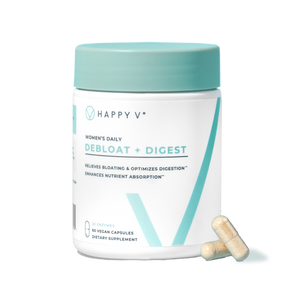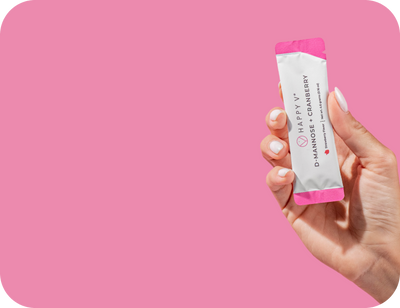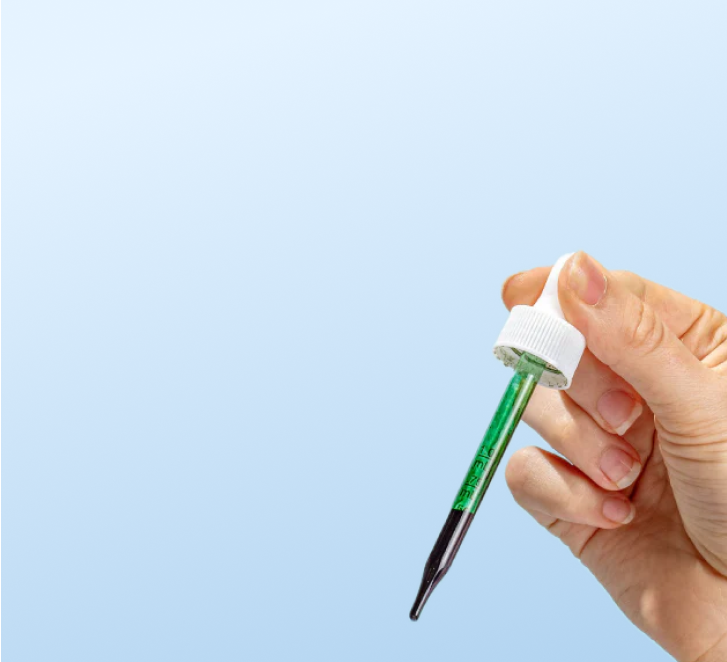- Fact Checked
- July 31, 2025
- 14 min read
What is the Best Probiotic for Women & Vaginal Health?
Table of Contents
Table of Contents
You may already know that probiotics are a game-changer when it comes to regulating digestion and improving your overall gut health. But did you know that probiotics can actually work that same magic in your vagina and urinary tract?
It’s true! Probiotic supplements may support or improve urinary and vaginal health by maintaining the natural balance of beneficial bacteria in those microbiomes. More beneficial bacteria in the urinary and vaginal microbiome may help maintain microbial balance, which is important for overall wellness.
If you regularly deal with constipation, bloating, or frequent vaginal infections, the question is not “Should I take probiotics?” but “What probiotics should I take?”
Unfortunately, answering this question isn’t always easy. Many businesses and advertisers sell probiotics that make a whole lot of claims but, at the end of the day, don’t do a whole lot to improve women’s health. So how can you spot the good from the bad?
We asked OB/GYN Dr. Barry Peskin for his advice. He’s a healthcare professional with decades of experience, and he gets asked about the benefits of probiotics and how to choose the right probiotic product on a nearly daily basis. Here’s the advice he shares with his patients.
This post is for informational purposes only and does not constitute medical advice. See full disclaimer below.
What Are Probiotics, Anyway?
Probiotics are live microorganisms that, when consumed in adequate amounts, provide health benefits to the host (that's you!). Think of them as the "good guys" of the microscopic world, friendly microbes that help maintain balance in your body's various ecosystems.
While most people associate probiotic supplements with digestive health and gut health, these beneficial bacteria actually play crucial roles throughout your body, including in your vaginal environment, keeping everything “down there” working as it should.
Probiotics & Your Vaginal Microbiome
The vagina is filled with millions and millions of different bacteria…and that's exactly how it should be! Collectively, these millions of microorganisms are known as the vaginal microbiome. This delicate ecosystem is dominated by various Lactobacillus species, probiotics that work around the clock to keep your intimate health in check.
Here's how Lactobacillus probiotics support optimal vaginal health:
Maintaining Optimal Vaginal pH
A healthy vaginal pH is slightly acidic, typically ranging between 3.8 and 4.5. Vaginal Lactobacilli produce lactic acid and hydrogen peroxide, which maintain this acidic vaginal environment.
Creating Protective Barrier
These good bacteria literally crowd out potential troublemakers (aka infection-causing microbes) by competing for space and nutrients, making it harder for harmful microorganisms to establish themselves and cause vaginal infections.
Supporting Natural Defenses
A healthy vaginal microbiome works in harmony with your immune system to identify and eliminate threats before they can cause problems like vaginitis or other vaginal infections.
Preventing Infections
By maintaining proper pH balance and bacterial balance, a healthy vaginal microbiome significantly reduces the risk of bacterial vaginosis (BV), yeast infections, and urinary tract infections (UTIs).
Who Should Consider Vaginal Probiotics?
While Dr. Peskin says anyone looking to support their long-term well-being could benefit from a daily vaginal probiotics, but says they can be particularly beneficial for various situations, including:
- Recurrent Vaginal Infections: If you're dealing with frequent yeast infections, bacterial vaginosis, or UTIs, probiotics may help break the cycle.
- Recent Antibiotic Use: Taking probiotics during and after antibiotic treatment can help restore beneficial bacteria that antibiotics may have eliminated.
- Hormonal Changes: Perimenopause, menopause, pregnancy, or starting new hormonal birth control can all benefit from probiotic support.
- Supporting an Active Lifestyles: Regular intense exercise, swimming, or activities that affect vaginal pH might benefit from probiotic support.
- Post-Sexual Activity: Some women find probiotics helpful after periods of new sexual activity or when changing partners.
- Overall Wellness Support: Even if you're not experiencing problems, probiotics can be part of a proactive approach to intimate health.
However, Dr. Peskin also cautions it's important to consult with a healthcare provider before starting any new supplement regimen, especially if you have underlying health conditions or are taking medications. Some people may experience mild side effects like bloating or digestive changes when first starting oral probiotics.
What Should You Look for in a Women’s Probiotic?
Dr. Peskin says that when it comes to choosing a probiotic supplement that will support women’s health, all the information you need is right there on the label—you just might not know how to make sense of it at first because dietary supplement labels don’t look like the food labels we’re used to.
A good probiotic supplement will have three things clearly listed:
1. The complete list of ingredients
If you look at the back of a probiotic supplement and see the words “blend” or “proprietary blend” anywhere, Dr. Peskin says to run.
Just like with food, every single ingredient contained in a supplement should be listed on the back. After all, this is something you’re putting in your body! You want—and deserve—to know exactly what’s included.
2. The genus, species, and STRAIN of each probiotic
Take a look at these two labels:


What’s the difference? They both list out the genus and species of each type of probiotic used in their formulation, but only one—Happy V’s—lists the strain.
So what does this mean, and why does it matter?
All living organisms are broken down into species and genus. For example, you may know the Latin name for humans is “Homo sapien.” In this example, “Homo” is the genus, and “sapien” is the species.
Most probiotics on the market consist of the two main genera, which have been heavily studied: Bifidobacterium and Lactobacillus. Within those genera, there are dozens of different species, and each is about as different as a modern human (a homo sapien) and a Neanderthal (a homo neanderthalensis).
But Dr. Peskin says knowing the probiotic species is also not enough. He says you want to know the exact strain of each probiotic used. Why? Dr. Peskin says each strain behaves a bit differently in the body, and certain strains have been studied while others are unproven. Especially if you’re dealing with uncomfortable BV or UTI symptoms, you don’t want to mess around with unproven strains.
Take a look at the two labels again. You’ll see that beneath each probiotic species, Happy V also lists the strain designation. Two strains to pay particular attention to are the Lactobacillus acidophilus strain LA-14® and the Lactobacillus rhamnosus strain HN001®. These are two of the most highly studied strains of Lactobacillus when it comes to women’s health specifically. Other strains of Lactobacillus have not shown such results.
3. The dosage for each probiotic
CFUs—or “colony forming units”—are the most responsible and transparent unit of measurement that should be used on a supplement label because this shows how many live probiotic strains the product contains.
And while you may think you want the probiotic supplement that has the most overall CFUs, Dr. Peskin says that’s actually not true. More is not always better with a lot of things in life—including probiotics!
The best probiotic contains an adequate volume of CFUs of the probiotic strains clinically proven to support your health goals. Good probiotics should also have the same number of CFUs in each serving.
🚫 Watch Out for Probiotic Stuffing!
This common industry trick includes lots of low-dose strains to make a product look more effective than it is.
Some brands profess to contain many different strains of bacteria while promoting their overall CFUs at a low price. However, they don’t put adequate CFUs of beneficial strains into their probiotic capsules or reveal how many individual CFUs of each strain is in the product. This practice is called probiotic stuffing, and it’s something Dr. Peskin says he sees a lot with the probiotics his patients ask him about.
Probiotic stuffing is the practice of including dozens of strains at low dosages in order to “stuff” the label with more probiotic cultures, making the product seem more attractive to the end consumer.
There are many ways that probiotic stuffing can occur:
- Advertisers can include a single or very few great bacterias at the right dosages and then add more ineffective probiotic cultures so they can stuff the supplement facts label.
- Advertisers can use a high number of cheap, ineffective probiotic strains and then lower the dosage on the effective ones to cut costs while still including them on the label.
- Strains can be batched into a proprietary blend, and the exact amount of CFUs per strain may not be shared at all.
- Companies might also have a couple of key strains that don’t survive very well over time and will include some more robust strains to keep the CFU level high over time.
At Happy V, we are transparent about our CFUs per strain, and we also do third-party testing to ensure that all our strains are guaranteed to the end of shelf life, so you know you are getting targeted support that does what it’s designed to do.
✅Choose the Delivery Method That Works for You
Just like not all probiotics are created equal, not all delivery methods work for each person. And convenience matters! To get benefits from your probiotics, Dr. Peskin says you have to be consistent and take them every day.
When it comes to common delivery methods, there are 3 main types. Which one you choose comes down to your health goals and lifestyle.
Vaginal Suppositories
When you want to go straight to the source, suppositories deliver targeted relief — fast. They’re especially helpful for recurrent or stubborn infections because they place the probiotics exactly where they’re needed most.
However, they can be a bit messy or awkward to use and aren’t as practical for long-term, everyday prevention.
Powder Formulas
Powders offer flexibility and control. You can mix them into drinks, tweak the dosage, and often store them without refrigeration. They’re great for customizing your routine, but like capsules, they still have to survive digestion, and honestly, the taste isn’t always a fan favorite. Plus, they’re less travel-friendly than capsules.
Oral Probiotics (Capsules or Powders)
Oral probiotics are the go-to for daily use and multitasking benefits. They’re easy to take and can support both gut and vaginal health. But there is one catch: they have to survive your stomach acid before they can get to work, meaning results may take a little longer. Not all strains can survive the trip, so it’s key to choose one proven to reach the vaginal microbiome effectively.
At Happy V, our probiotic capsules are designed for potency and convenience, made to survive stomach acid and deliver clinically supported strains to where they matter most.
What is the Best Probiotic for Vaginal Health?
“Participants who took LA-14® and HN001® experienced significant improvements in vaginal symptoms and reduced BV recurrence, compared to the placebo group.” – Dr. Peskin
When it comes to probiotics to support vaginal health, especially for those prone to imbalance or discomfort, Dr. Peskin says to look for those two strains of vaginal Lactobacillus spp we mentioned earlier: LA-14® and HN001®.
A double-blind, randomized, placebo-controlled study (aka the most rigorous clinical study you can get) found that when taken together, these two probiotics strains helped to restore healthy vaginal microbiota and also relieved uncomfortable vaginal symptoms, including vaginal discharge and itching. The study also showed that these two probiotic strains were associated with a reduction in BV occurrences.
While other probiotic strains may help with digestive tract issues, if you are looking for help with vaginal infections specifically, LA-14® and HN001® are powerful strains to have on any supplement label.
Vaginal Probiotics vs. Gut Probiotics: What's the Difference?
So do you really have to get a targeted vaginal probiotic? Can’t you just take a general probiotic or one marketed for gut health? If we’re talking about quality vaginal probiotics, Dr. Peskin says there is a distinct difference, and to really support intimate wellness, it helps to understand what that difference is.
Strain Specificity
Gut health probiotics often contain Bifidobacterium species and different Lactobacillus strains than those that naturally dominate the vaginal environment. Women's probiotics are specifically formulated with probiotic strains that research has shown to colonize and benefit vaginal health.
pH Requirements
Your gut operates at a more neutral pH (around 6-7), while your vagina thrives in an acidic environment (3.8-4.5). Probiotic supplements formulated for vaginal health are designed to support this acidic environment.
Colonization Patterns
The strains in vaginal probiotics have been selected for their ability to adhere to vaginal tissue and establish residence in the vaginal environment, rather than just passing through like many gut probiotics.
Targeted Benefits
While gut health probiotics focus on digestive health, immune support, and overall wellness, vaginal probiotics specifically target issues like bacterial vaginosis, yeast infections, and urinary tract health.
That said, there is some crossover. A strong gut microbiome supports your immune system, which in turn helps maintain vaginal balance. Certain strains, like Lactobacillus rhamnosus and Lactobacillus reuteri (found in Happy V’s doctor-formulated blend) have been shown to benefit both gut and vaginal health. Still, for the most targeted support against BV, yeast infections, and UTIs, women’s probiotics designed with vaginal-specific strains are the most effective choice.
How Can You Tell if Your Probiotic is Working?
Here’s what Dr. Peskin says to his patients when taking probiotics: “Pay attention to your body. It’s helpful to reflect on the changes you notice over time, particularly when it comes to symptom prevalence and severity. If symptoms persist or worsen, consult a healthcare provider.”
As for how long to wait for improvements, every body is different, but Dr. Peskin says that most patients see improvements within 2–3 months of using a high-quality probiotic. Two months is exactly how long it took for 29-year-old Keora to notice a difference after taking Happy V probiotics. Keora’s struggles with recurring BV began during pregnancy. She says,
“After 2 months of taking Happy V, the smell was gone, and my labs showed no Gardnerella.”†
Are Probiotic Supplements Regulated?
Here's something that’s really important to understand: probiotic supplements are regulated as dietary supplements, not as medications. In the United States, this means:
- The FDA doesn't pre-approve probiotic supplements for safety and effectiveness like they do with prescription drugs
- Manufacturers are responsible for ensuring their products are safe and accurately labeled
- Claims about health benefits don't require FDA approval before products hit the market
- Quality can vary significantly between brands
How to protect yourself
To make sure you’re getting a probiotic that actually delivers on its promises
- Choose the best probiotics from reputable companies with third-party testing
- Look for specific probiotic strain names and CFU (colony-forming unit) counts on labels
- Check for certifications like NSF International or USP verification
- Research the company's manufacturing practices and quality standards
- Consult with healthcare providers or gynecology specialists, especially if you have underlying health conditions
Something else you should know? Happy V does all of its own manufacturing in-house. That means complete control over strain quality, dosing accuracy, and safety, so you know exactly what you’re putting in your body.
For Clinically Proven Probiotics, Choose Happy V
Dr. Peskin’s advice will help you make a high-quality supplement purchase, no matter what brand you ultimately choose.
If you want to save yourself time, though, know that Happy V® probiotics meet all of Dr. Peskin’s requirements while also being GMO- and gluten-free.
Our Prebiotic + Probiotic is packed with seven specific strains that introduce good bacteria and optimize the pH level of your vaginal microbiota to support your overall vaginal health. If you want to support vaginal balance, gut health, and overall well-being, try Happy V’s clinically studied probiotic formula.
† Disclaimer: This blog is for informational purposes only. It is not intended to diagnose, treat, cure, or prevent any disease. Statements regarding supplements have not been evaluated by the FDA. Always consult a healthcare professional before starting any new supplement or treatment.
FAQ
Do vaginal probiotics work?
How long does it take for Happy V Vaginal Probiotics to work?
How long should I take Happy V® Probiotics?
Our experts continually monitor the health and wellness space, and we update our articles when new information becomes available.
- Published on: July 31, 2025
- Last updates: November 04, 2025
Written by Hans Graubard
Edited by Liz Breen












